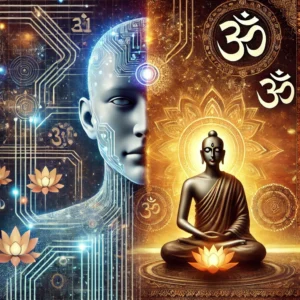
technology and spirituality
AI and Its Impact on Spiritual Practices: Bridging Ancient Wisdom with Modern Technology
The intersection of artificial intelligence (AI) and spirituality is a fascinating realm where ancient wisdom meets modern innovation. As AI continues to shape various aspects of our lives, it is also transforming how individuals approach and experience spirituality. From enhancing meditation techniques to providing personalized guidance, AI is revolutionizing spiritual practices in unprecedented ways. This article explores how AI is impacting spiritual practices, the benefits and challenges it brings, and its potential future role in the realm of the divine.
Understanding Spiritual Practices in the Digital Age
Spiritual practices have been integral to human civilization for thousands of years. Whether it’s meditation, prayer, rituals, or self-reflection, these practices have traditionally been rooted in human connection, intuition, and ancient traditions. However, as the world becomes increasingly digital, technology is playing a growing role in reshaping spiritual experiences.
In the modern world, people often face barriers to engaging in traditional spiritual practices due to time constraints, geographic limitations, or lack of access to resources. AI addresses these challenges by offering innovative solutions that blend tradition with technology. For instance, AI-driven tools help individuals practice mindfulness on their own schedule, access ancient texts in their native language, and engage with global spiritual communities in real-time. These advancements are democratizing spirituality, making it accessible to anyone with an internet connection.
AI in Meditation and Mindfulness
Meditation and mindfulness are among the most popular spiritual practices that AI is transforming. With stress and anxiety becoming increasingly prevalent in modern society, AI-driven tools are helping individuals find peace and balance.
- Personalized Meditation Practices
Meditation apps like Calm, Headspace, and Insight Timer use AI to deliver guided meditation sessions tailored to individual needs. These apps track user data such as session duration, preferred techniques, and emotional state to suggest personalized routines. For example, someone experiencing high stress may be guided toward breathing exercises, while another individual seeking focus might receive tailored concentration techniques.
This level of personalization ensures that users receive guidance that aligns with their unique mental and emotional states, making meditation more effective.
- Real-Time Feedback with Wearable Technology
Wearable devices such as Muse, Fitbit, and Apple Watch integrate AI to monitor brain activity, heart rate, and stress levels during meditation. These devices provide real-time feedback, enabling users to refine their practice. For instance, if the AI detects increased stress levels or wandering focus, it may suggest calming soundscapes, shorter meditation durations, or specific visualization techniques.
- Virtual Meditation Coaches
AI-powered chatbots and virtual assistants act as meditation coaches, guiding users through sessions and answering their questions. These bots use natural language processing (NLP) to simulate human-like interactions, creating a supportive environment for beginners and seasoned practitioners alike. Over time, these AI coaches adapt to the user’s preferences, offering tailored suggestions that enhance their spiritual growth.
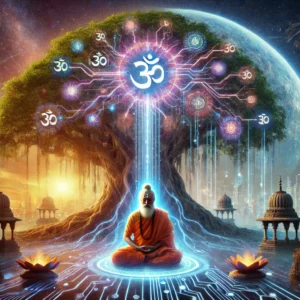
Table of Contents
AI in Prayer and Rituals
Prayer and rituals have deep cultural and spiritual significance in many traditions. AI is playing an increasingly significant role in modernizing these practices without diluting their essence.
- Digital Prayer Companions
AI is making prayer more accessible to people across the globe. Apps and devices like Amazon Alexa and Google Assistant can recite prayers, chants, or mantras in multiple languages, allowing individuals to engage in spiritual practices even when they lack traditional resources. For example, a Hindu devotee in a foreign country can use an AI app to chant Vedic mantras in perfect Sanskrit pronunciation.
- Automated Rituals
In some temples, AI and robotics are being used to perform rituals. For instance, robotic priests in Japan conduct Buddhist ceremonies, while in India, temples like the Siddhivinayak Temple in Mumbai use AI for chanting mantras during aarti. These technologies ensure that rituals are performed consistently, even in the absence of human priests.
In addition, AI enables virtual rituals for devotees who cannot attend ceremonies in person. For instance, individuals can participate in live-streamed rituals, where AI manages the sequencing and logistics of the event.
- Prayer Analytics
AI tools analyze prayer patterns and provide insights to practitioners. For instance, these tools can track the frequency and duration of prayers, helping individuals remain consistent in their spiritual routines. This data-driven approach motivates users to stay on track and deepens their spiritual commitment.
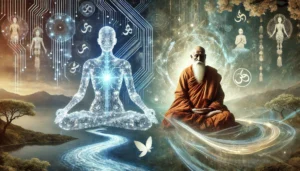
technology and spirituality
Virtual Reality and AI in Spiritual Experiences
The integration of virtual reality (VR) with AI has opened new possibilities for immersive spiritual experiences.
- Virtual Pilgrimages
For those unable to visit sacred sites due to physical or financial constraints, VR powered by AI offers virtual pilgrimages. Users can explore places like Varanasi, Mecca, Jerusalem, or the Vatican from their homes, guided by AI narrators that provide historical and spiritual context. This not only makes sacred places accessible but also fosters a deeper connection with global spiritual heritage.
- Sacred Space Simulations
AI-driven VR environments recreate sacred spaces, allowing individuals to meditate or pray in a serene setting. For example, VR can simulate a tranquil Himalayan monastery or a serene riverside Ghat. These virtual spaces help individuals disconnect from their hectic surroundings and immerse themselves in spirituality.
- Interactive Mythological Stories
AI algorithms can generate interactive narratives based on ancient mythologies, allowing users to experience these stories in a deeply engaging way. For instance, individuals can “witness” the battle between Lord Rama and Ravana or Krishna’s teachings in the Bhagavad Gita through VR simulations. This not only enriches spiritual understanding but also makes ancient teachings accessible to younger generations.
AI in Spiritual Counseling and Guidance
- Chatbots for Spiritual Guidance
AI chatbots like Replika and Woebot are increasingly used for spiritual counseling. These bots use machine learning to provide empathetic responses and suggest spiritual practices tailored to the user’s emotional state. For example, someone feeling overwhelmed might receive a recommendation to engage in mindfulness practices, while another user seeking purpose might be guided to ancient philosophical texts.
- Astrology and AI
Vedic astrology, a cornerstone of Indian spirituality, is also being transformed by AI. Platforms like AstroVed use AI to generate personalized horoscopes, analyze planetary positions, and offer insights based on ancient astrological principles. These tools bring precision to astrology and make it accessible to a wider audience.
- Virtual Gurus
AI-powered virtual gurus provide spiritual teachings and answer queries through NLP. These virtual mentors replicate the wisdom of human gurus, making spiritual guidance accessible to a global audience. While they cannot replace the intuition and empathy of a human teacher, virtual gurus serve as valuable supplements, especially for those without access to traditional spiritual leaders.
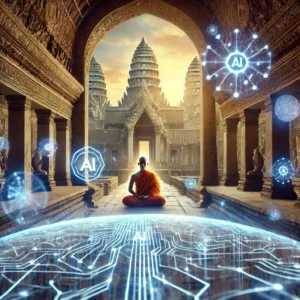
technology and spirituality
The Ethical Implications of AI in Spirituality
While AI offers numerous benefits, its integration into spiritual practices raises ethical questions.
- Authenticity vs. Automation
Can AI truly replicate the authenticity of human-led spiritual practices? Critics argue that the emotional depth, intuition, and soulfulness of a human guru or community cannot be replaced by a machine.
- Privacy Concerns
AI-driven spiritual apps collect sensitive data about users’ beliefs and practices. Ensuring the security and ethical use of this data is a significant challenge. Misuse of such data could lead to commercial exploitation or breaches of trust.
- Commercialization of Spirituality
The rise of AI in spirituality risks turning sacred practices into commodified services, undermining their deeper significance. This commercialization may dilute the sanctity of spiritual traditions.
- Dependence on Technology
Over-reliance on AI could lead to a loss of personal connection and self-reliance in spiritual journeys. It is essential to strike a balance between technological assistance and personal introspection.
The Future of AI in Spiritual Practices
As AI continues to evolve, its potential impact on spirituality is boundless. Some possible future developments include:
AI-Powered Spiritual Communities
Virtual spiritual communities could bring together individuals from diverse backgrounds, fostering global connections. AI could facilitate discussions, recommend practices, and create shared spiritual experiences.
Advanced Emotional AI
AI capable of understanding complex human emotions could provide even more nuanced spiritual guidance, offering tailored advice based on an individual’s spiritual and emotional state.
AI in Scriptural Analysis
Advanced AI tools could analyze ancient scriptures to uncover hidden insights and connections. This could revolutionize the way sacred texts are understood and interpreted.
Integration with Biotech
AI combined with biotechnology could enable deep states of meditation and spiritual awakening through neurofeedback and brain stimulation. Such innovations could make profound spiritual experiences more accessible.
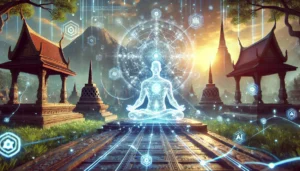
technology and spirituality
Global Spiritual Heritage Databases
AI could compile and analyze a comprehensive database of global spiritual practices, fostering intercultural understanding and appreciation.
Conclusion
AI is undeniably transforming spiritual practices, offering innovative tools that make ancient traditions more accessible and personalized. While it cannot replace the essence of human connection and intuition, it serves as a powerful ally in enhancing spiritual journeys. By embracing AI with mindfulness and ethical considerations, humanity can bridge the gap between ancient wisdom and modern technology, creating a harmonious path forward in the digital age.
As AI continues to evolve, its potential to deepen our understanding of spirituality and foster global spiritual connections will only grow, marking a new chapter in the timeless journey of the human spirit.
FAQs for the article “Artificial Intelligence and Spirituality: Transforming Ancient Practices for the Modern World”:
- What is the connection between Artificial Intelligence and spirituality?
Artificial Intelligence (AI) bridges the gap between modern technology and age-old spiritual practices. By leveraging AI, individuals can access personalized spiritual guidance, explore ancient philosophies, and practice mindfulness in ways that fit into their busy lives. For instance, AI tools analyze behavioral patterns to recommend meditation techniques, helping users achieve inner peace more efficiently. AI also facilitates the preservation of spiritual texts and cultural heritage, allowing people to reconnect with their roots.
- Can AI enhance traditional spiritual practices?
AI has introduced several innovations to enhance traditional spiritual practices. For example:
Meditation: Apps like Calm and Headspace use AI to create customized meditation routines.
Pilgrimage Assistance: Smart systems in temples help manage crowds and provide real-time information about rituals and timings.
Ritual Automation: In some temples, AI-powered robots are performing basic rituals like aarti or distributing prasad.
These applications make spiritual practices more accessible, especially for people living far from traditional centers of worship.
- How is AI used in meditation and mindfulness?
AI revolutionizes meditation and mindfulness by tailoring experiences to individual needs. Key examples include:
Personalized Recommendations: AI analyzes stress levels, sleeping patterns, and activity data from wearables to recommend suitable meditation exercises.
Real-time Feedback: Tools like Muse use sensors and AI to monitor brain activity and provide feedback to enhance focus during meditation.
Voice-Guided Sessions: AI creates voice-guided meditations based on the user’s mood, goals, or challenges, making mindfulness approachable for beginners and experts alike.
- Are there AI tools for learning about ancient scriptures or philosophies?
Yes, AI is a powerful tool for studying and disseminating ancient scriptures and philosophies. For example:
Text Translation and Analysis: AI algorithms translate and interpret sacred texts like the Vedas, Upanishads, and Bhagavad Gita into modern languages, preserving their wisdom for a global audience.
Sanskrit Learning Apps: AI-powered language apps simplify learning Sanskrit, enabling users to read and understand ancient texts.
Digital Archives: Platforms like Google Arts & Culture create virtual archives of spiritual manuscripts and artifacts, ensuring their longevity.
- Can AI replace spiritual leaders or gurus?
While AI provides valuable guidance, it cannot replace the depth of wisdom and emotional connection offered by spiritual leaders. Gurus possess intuition, empathy, and the ability to address complex personal issues, qualities AI currently lacks. AI serves as a complementary tool by offering accessible resources and routine guidance, but it falls short in addressing deeper existential or emotional challenges.
- Is AI being used in religious rituals?
AI is being adopted in certain aspects of religious rituals, particularly in urban temples and modern spiritual spaces. Examples include:
Robotic Priests: In Japan, robotic monks chant sutras during Buddhist ceremonies. Similar applications are emerging in Indian temples.
Automated Services: AI systems manage prasad distribution, queue management, and darshan schedules for devotees, ensuring smoother experiences.
Virtual Rituals: AI-driven virtual platforms allow people to participate in pujas and ceremonies remotely, making rituals accessible globally.
- What are the ethical concerns of using AI in spirituality?
The use of AI in spirituality raises several ethical questions:
Data Privacy: Apps may collect sensitive personal information about users’ spiritual habits and mental states, risking misuse of data.
Commercialization: Spiritual practices might become overly commercialized when mediated by AI, diluting their sanctity.
Loss of Human Touch: Over-reliance on AI could erode the authenticity and emotional depth of spiritual experiences, reducing them to automated interactions.
Addressing these concerns requires transparency, ethical AI development, and respect for cultural traditions.
- How does AI help preserve spiritual traditions?
AI plays a critical role in preserving spiritual traditions for future generations:
Digitization: Sacred manuscripts and oral traditions are being digitized using AI, preventing loss due to decay or neglect.
Virtual Reality Experiences: AI creates immersive 3D models of ancient temples and pilgrimage sites, allowing people to experience them virtually.
Historical Analysis: Machine learning analyzes historical data to uncover patterns and insights about spiritual practices and their evolution.
- Are there any risks of relying on AI for spirituality?
Over-reliance on AI for spiritual growth poses several risks:
Superficial Understanding: Automated systems may provide surface-level knowledge without the depth required for true spiritual progress.
Dependency: People might lose the ability to introspect or engage deeply with spiritual practices without AI tools.
Cultural Dilution: Traditional rituals might be altered or oversimplified to fit AI frameworks, leading to a loss of authenticity.
Maintaining a balance between technology and tradition is essential.
- What is the future of AI in spirituality?
The future of AI in spirituality is promising and innovative. Potential advancements include:
Immersive Experiences: AI combined with AR/VR could recreate ancient rituals or environments, offering deeply immersive spiritual experiences.
Global Accessibility: AI will continue to make ancient wisdom and spiritual practices available to a broader audience.
Personalized Growth: With better AI algorithms, tools can guide individuals on unique spiritual journeys tailored to their needs, blending modern and traditional approaches.
Summary
The convergence of artificial intelligence (AI) and spirituality is reshaping how ancient practices are understood and experienced in the modern era. This article explores how AI-driven technologies, such as meditation apps, virtual reality, and personalized spiritual coaching, are making age-old practices more accessible to a global audience. AI is not only helping individuals deepen their spiritual journeys but is also preserving ancient traditions, such as sacred chants, rituals, and texts, by digitizing and analyzing them for future generations.
The article delves into AI’s role in creating immersive spiritual experiences, such as guided meditations tailored to individual needs, virtual pilgrimages to sacred sites, and AI-generated interpretations of spiritual texts. It also discusses ethical concerns, such as the potential commercialization of spirituality and the risk of losing the authenticity of ancient wisdom. Drawing from Hindu philosophy and other spiritual traditions, the article emphasizes the need to balance technological innovation with the essence of spirituality, ensuring AI serves as a tool for inner growth and global connection rather than mere convenience.
By bridging the gap between tradition and technology, AI has the potential to transform spiritual practices, making them more relevant and engaging for modern seekers while preserving their timeless essence.
Related Articles
“Ancient Indian Wisdom: Timeless Lessons for Tackling Today’s Climate Crisis”- “Artificial Intelligence and Spirituality: Transforming Ancient Practices for the Modern World”
- “Gold and Real Estate in India: Timeless Assets Shaping Financial Strategies”
- “Divine Feminine Power in Hindu Mythology: The Legends of Durga, Saraswati, and Lakshmi”
- “Divine Beings of Sanatan Dharma: The Spiritual Significance of Sacred Animals in Hinduism”
- “Symbolism in Mythological Art: Unlocking Hidden Meanings in Ancient Temple Carvings”
- “Exploring Technological Advancements in Ancient India and Civilizations: Vimana, Metallurgy, & Water Management systems”
- Unveiling the Mysteries: Ancient Temples of Sanatan Dharma , Mysterious Temples of India
- “The Scientific Knowledge of Sanatan Dharma: Ancient Wisdom Meets Modern Science”
- Ancient Indian Sports and Games: Celebrating a Legacy of Skill, Strength & Strategy”
- “Exploring the Cosmic Link: The Connection Between Astronomy and Vedic Astrology”
- The Power of Sanskrit: Unlocking the Divine Language of the Gods
- “The End of Kaliyuga: A Sanatan Insight into the World’s Final Chapter”
- Explore more articles on Prachin Sanatan Yuga.
technology and spirituality technology and spirituality technology and spirituality technology and spirituality technology and spirituality technology and spirituality technology and spirituality technology and spirituality technology and spirituality technology and spirituality technology and spirituality technology and spirituality technology and spirituality technology and spirituality technology and spirituality technology and spirituality technology and spirituality technology and spirituality technology and spirituality technology and spiritualitytechnology and spirituality technology and spirituality technology and spirituality technology and spiritualitytechnology and spirituality technology and spirituality technology and spirituality technology and spirituality
